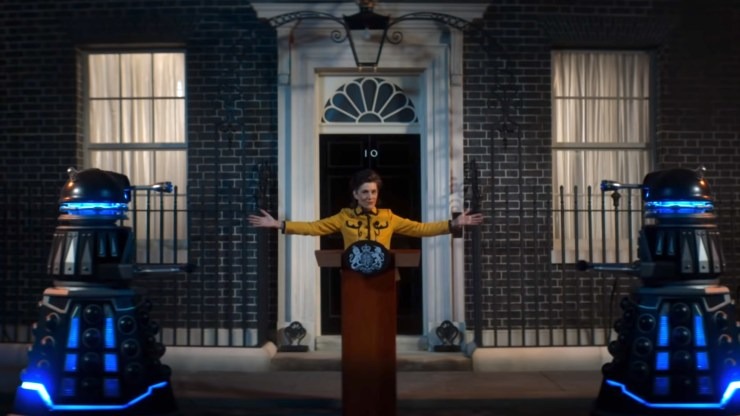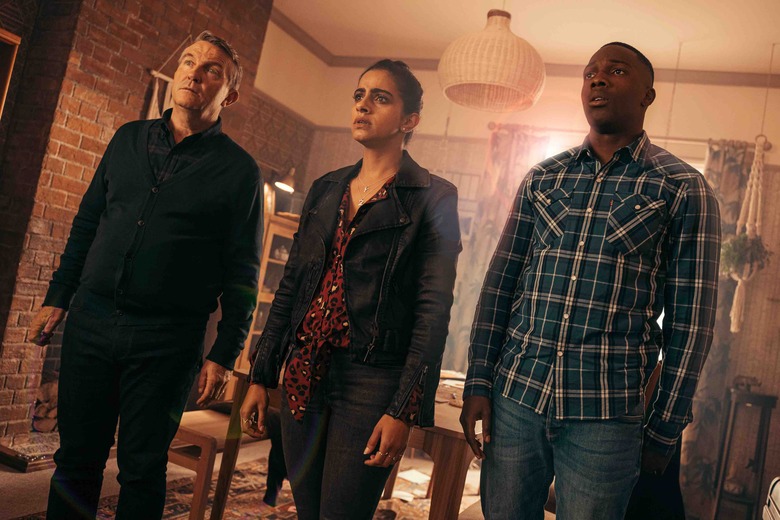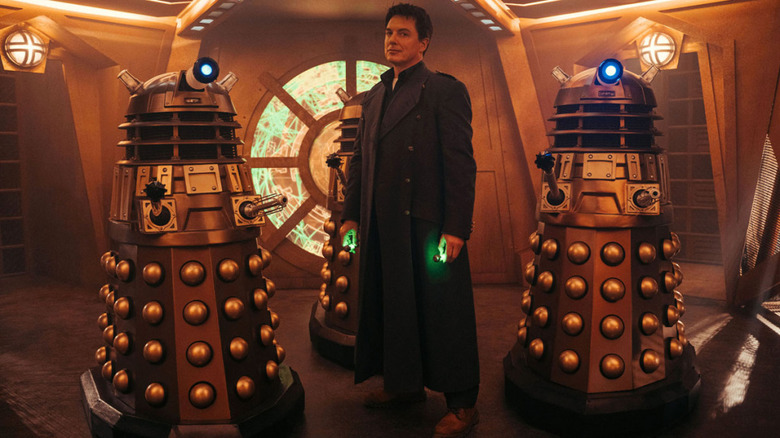'Doctor Who' Tries To Resolve Its Identity Crisis With The Mostly Solid "Revolution Of The Daleks"
For the past two seasons, Doctor Who has been going through an identity crisis. What kind of show is Doctor Who now? What kind of character is Jodie Whittaker's Doctor? The answer has constantly eluded us, even 22 episodes into showrunner Chris Chibnall's era. Russell T. Davies' era was the campy family soap. Steven Moffat's was the fairy tale adventure. And now, as we head into a new year and the 3rd season of Chris Chibnall's era (13th overall), we still have no idea what kind of show our beloved, ever-changing sci-fi series is aiming to be.
But the show has been slowly improving since Whittaker first fell into a Sheffield train car in "The Woman Who Fell to Earth." A rocky season 11 gave way to a more entertaining, if still overstuffed, season 12 that ultimately ended on yet another uncertain note: a lore-altering twist that piled yet another identity crisis onto a show that was still trying to figure out what it was. The latest episode, "Revolution of the Daleks," which follows up the game-changing season 12 finale "The Timeless Children," embodies both the strengths and weaknesses of the past two seasons. It's a mostly solid 2020 New Year's special with way too much exposition and some promising glimmers of character conflict and development, that tries to make up for a lack of identity with a lot of nostalgic callbacks to the Davies era. We get it, Jack, you're immortal.
You Say You Want a Revolution
"A long time ago (2019), far away (Cheltenham)," reads the opening title card for "Revolution of the Daleks," in a chuckle-worthy bit of comedy that suggests Chibnall is letting loose a bit and injecting a little humor in his writing. Light chuckles are the most we'll get in a Chibnall script, unfortunately, but it's a sign that the writer is growing and learning from his criticisms — the themes of this very episode!
In this flashback to the aftermath of "Resolution," two stern-looking officials are carting away the destroyed Dalek shell, the driver spelling his doom when his superior asks him how his mother is (a little bit of sad backstory before he gets needlessly killed!) and asks for permission to stop for a cup of tea. At this tea stop, the driver is poisoned by the food cart lady, who steals the truck for apparently nefarious purposes. The man behind the theft: Jack Robertson (Chris Noth, upping the slime and sleaze tenfold in his return as the villain from "Arachnids of the U.K."), who crafts "security droids" with his science expert Leo (a perfectly nebbish Nathan Stewart-Jarrett) for the new ambitious technology secretary Jo Patterson (Harriet Walter, doing a thinly veiled take on Theresa May). "Leo has something...revolutionary to show you," Robertson says to Patterson, who is revealed to have tipped him off about the Dalek shell transport. The pair show off the security droids' capabilities, which include a water cannon, CS gas deployment, and a "sonic deterrent," which easily incapacitates the group of protestors that Robertson has set up for the demonstration.
There's an incisive bit of political commentary that this episode touches on, especially in the alarming imagery of security droids used against protestors in the face of increasing "civil unrest." But the episode never gets to the point of full-blown political satire, because our reliable "Fam" is on the case — having noticed now-Prime Minster Jo Patterson's rollout of the "security droids." Ryan (Tosin Cole) and Graham (Bradley Walsh) have become accustomed to living on Earth in the 10 months since the Doctor disappeared without a word, but Yaz (Mandip Gill) is still desperate to find her, camping out in the TARDIS that had brought them home and covering the bright walls with sheets of paper and post-it notes with her theories. Ryan and Graham snap Yaz out of her obsession with the news of the return of the Daleks, which the group jump to start investigating.
But in the middle of their investigation, they're interrupted by a familiar sound: the whooshing of the TARDIS, which lands right in the middle of Graham's living room, the Doctor cheerily stepping out to explain that she was in "space jail." The sequence of the Doctor being stuck in the Judoon-run prison is fun and full of fan service — the Doctor greeting cameras, her fellow prisoners like "Angela" the Weeping Angel, and explaining to a Pting that "you can't eat the cage, believe me I tried" — but ultimately rendered pointless quickly, as the Doctor is broken out by Captain Jack Harkness (John Barrowman, having a blast back in the familiar coat) mere minutes in — though for her, several decades. While the reunion of the Doctor and Jack is wonderful — the two of them repeating their banter from the Tenth Doctor and Jack's meeting, and breaking out of the prison in the equivalent of an invulnerable hamster ball — it doesn't help the criticisms that Whittaker's Doctor is too passive a character, nor does it help that Barrowman often threatens to steal the scene from Whittaker whenever they share a screen. But one refreshing aspect of this episode: conflict! The companions bristle at Whittaker's breezy attitude after her long disappearance, none feeling more betrayed than Yaz, who shoves her and remains mistrusting of the Doctor for the rest of the episode.
We're The Lucky Ones
After the awkward reunion, Team TARDIS immediately jump to action, the Doctor sending Jack and Yaz to investigate the signs of Dalek organic matter in Osaka, while she, Ryan, and Graham go to confront Jack Robertson, who is even unaware of his company's mysterious "Osaka branch." But the audience isn't, having just been shown the master plan hatched by the surviving Recon Dalek, which had been cloned by the curious Leo, and had built a whole secret warehouse to clone more Daleks. Even Robertson had been disgusted by Leo's experiment, ordering him to incinerate it, which naturally goes wrong, leading the Dalek to attack and possess Leo.
Perhaps it was the 19 years he spent in prison to break out the Doctor, but Jack is much more chatty with this group of people he just met, explaining his whole life story to Team TARDIS just to give us a name-drop of Rose. It's a bit of nostalgia-baiting for Davies-era fans, but feels more like a symptom of Chibnall's tendency to tell, not show — as is the rest of the exposition-heavy plot, and the occasional 1:1 conversations between characters that bring the episode's momentum to a halt. But the one promising intimate character moment we get plays out between Jack and Yaz, as Yaz expresses her disappointment with the Doctor disappearing, while Jack assures her that this is how it is to travel with the Doctor. "We're the lucky ones, Yaz," he says to a still-skeptical Yaz.
The 1:1 plot-stopping conversation that doesn't work, however, is the one between the Doctor and Ryan, who is visibly unexcited by things this whole episode (Cole, I fear, phoning in his usual monotone performance even more). In a bizarrely long trip from England to Osaka (since when does it take 4 minutes to travel across the world?), the Doctor unloads what she's finally learned about her origin to Ryan, who promises her that she will be the same Doctor they've always known — a moment that would feel sweet if this wasn't the first time the Doctor and Ryan had an actual conversation by themselves, and that it wasn't foreshadowing of Ryan's departure at the end of the episode. But at least this episode's relatively simple plot gives us things that the series has been lacking since Chibnall took the reins: genuine character conflict and development, and fewer exposition dumps.
The One Who Stops the Daleks
I say fewer exposition dumps, but even the Dalek isn't shielded from having to give long-winded explanations of its dastardly plan, though longtime Dalek voice actor Nicholas Briggs does make a meal of it. After Jack and Yaz survive an attack by two of the Dalek face huggers, the Doctor and co. join them with a baffled Robertson in tow, to learn from the Dalek-possessed Leo of the Daleks' plans to take over the empty "security droid" shells. And they quickly act on their plan, transporting into the Dalek shells around the country and immediately launching an attack on humans. This sequence is a standout of the episode, the stakes and escalating body count feeling real even as thousands of CGI Daleks (looking better than ever, thanks to this era's improved budget) flood the skies. The red light filling the Dalek eye piece is a nice visual cue, and Patterson's noble death in the wake of her security drones turning on her plays well. For all his faults, Chibnall knows how to write a good Dalek story, and this is when the episode starts to feel properly Doctor Who.
This feeling continues with the Doctor's solution to stop the Daleks: by calling more Daleks. She proposes the nuclear option of luring in the Dalek Death Squad, a team dedicated to killing impure Daleks, which Jack immediately bristles at. But the Doctor is determined, and newly assured of her role, even in the midst of her identity crisis, declaring, "All that time in a cell wondering who I am. I'm the doctor, I'm the one who stops the Daleks." For all of Whittaker's inspirational speeches, this is the time when she's felt truly like the Doctor, and even more so when she pulls off the bait-and-switch of defeating the Dalek Death Squad, by bombing their ship (with the help of Jack, Ryan, and Graham) and luring them into the spare TARDIS with a hologram of herself, setting up the TARDIS to implode on itself and send the Daleks into the void. Even Robertson's eleventh-hour betrayal of the Doctor to the Death Squad Daleks doesn't phase her, and we get the Doctor pulling off a properly clever and unexpected victory that finally makes her feel like the smartest person in the room (aside from the uncomfortable morality of the Doctor killing a sentient TARDIS).
The denouement of the adventure is a little abrupt, with the episode suddenly cutting to Robertson's news interview in which he takes all the credit for saving Earth, while the Doctor listens to a voicemail from Captain Jack, bidding farewell over the phone. (Barrowman's busy schedule may have led to this weirdly abrupt goodbye for an appearance that was so heavily marketed.) We get a bunch of strange Dutch angles for the final scene between Team TARDIS (Lee Haven Jones' direction for this entire episode was a little bit weird in general) and the Doctor, as Ryan reveals that he plans to stay. "My mates need me and it may sound stupid but I think my planet needs me," he explains, not all too convincingly, as we've had maybe two scenes with Ryan's friends this entire era. But it will be sad to see the departure of Graham, the one fleshed out companion of these first two seasons, as he decides to stay with his grandson. The scene where the Doctor babbles sadly, wondering if she can change the timeline and convince them to stay, is really wonderful and one of the few times I've been convinced of this group's affection for each other. "It's ok to be sad," Yaz tells the Doctor, in a wonderfully bittersweet final line.
Or not. Because we have to get a full-circle ending to Ryan and Graham's arc, with Ryan once again practicing to ride a bike, before discussing strange reports around the world. The pair of them are resolute in their new mission as defenders of the Earth, seeing a ghostly vision of Grace in the horizon.
Like 2019's "Resolution," "Revolution of the Daleks" is much more a finale to Doctor Who season 12, and features a pretty good Dalek plot (I'll give this to Chibnall, he can write a good Dalek story). While it doesn't deliver on the promise of its premise, it does live up to its New Year's Day release with a farewell to some old friends (bye Ryan, we barely knew ya!) and a step in the right direction for the persona of Whittaker's Doctor. Her past doesn't matter, she declares, as long as she's still the Doctor, the enemy of the Daleks and the saver of the day.
Tidbits in Time and Space



